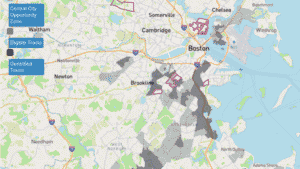Income and home price gains were concentrated in a handful of neighborhoods in booming U.S. cities including Boston during a portion of the past decade, according to a study of wealth concentration and gentrification patterns.
The study by the National Community Reinvestment Coalition took a look at nearly 10,000 census tracts nationwide in the lower 40th percentile for income and home values, and compared gains in income, home value and education levels to measure gentrification from 2014 to 2017. Half of all gentrifying neighborhoods nationwide were located in 20 cities, with San Francisco, Denver and Boston leading the list.
“Gentrification remains a significant threat to minority and LMI families in some of the largest and most prosperous parts of the country,” the report stated.
The results spotlight the risks to minority and low-income households in some of the wealthiest cities, and likelihood that the neighborhoods will experience “cultural displacement” such as changes in racial and social composition, the report said.
The analysis found recent gentrification in 16 of 75 census tracts analyzed in Boston, many of them located along the I-93 corridor from South End to Neponset.
Its findings were released last month as Boston officials discuss changes to the city’s zoning code designed to limit displacement. The proposed fair housing amendments would require the Boston Planning and Development Agency to consider segregation and displacement when reviewing new projects.




 |
| 




